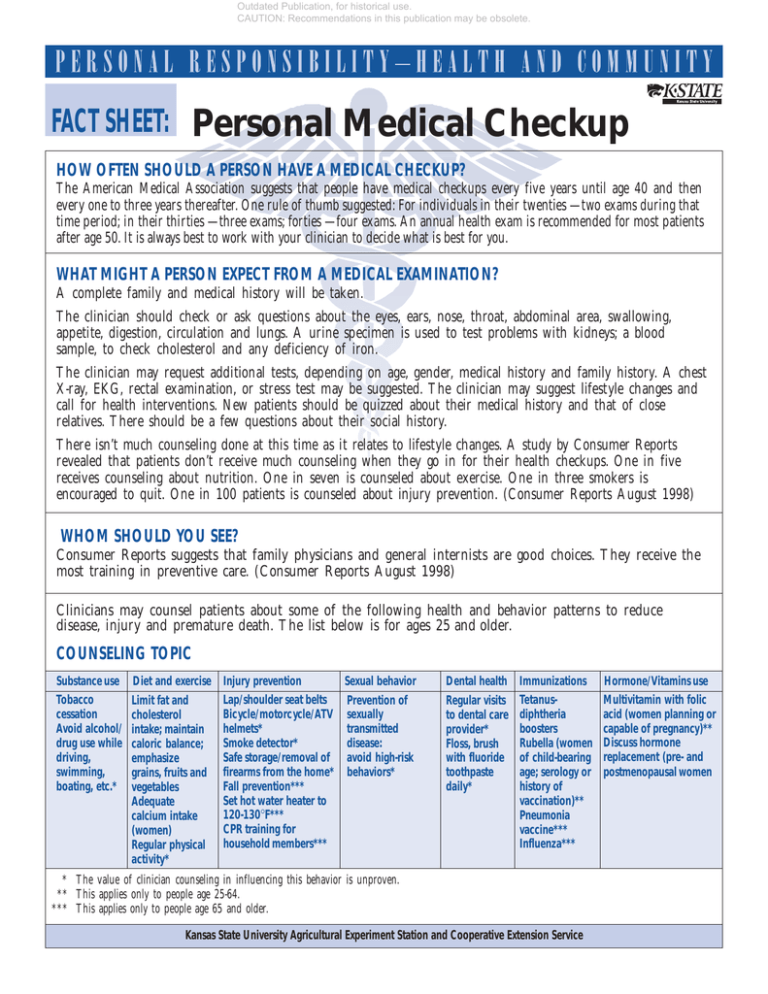
Outdated Publication, for historical use.
CAUTION: Recommendations in this publication may be obsolete.
FACT SHEET: Personal Medical Checkup
HOW OFTEN SHOULD A PERSON HAVE A MEDICAL CHECKUP?
The American Medical Association suggests that people have medical checkups every five years until age 40 and then
every one to three years thereafter. One rule of thumb suggested: For individuals in their twenties — two exams during that
time period; in their thirties — three exams; forties — four exams. An annual health exam is recommended for most patients
after age 50. It is always best to work with your clinician to decide what is best for you.
WHAT MIGHT A PERSON EXPECT FROM A MEDICAL EXAMINATION?
A complete family and medical history will be taken.
The clinician should check or ask questions about the eyes, ears, nose, throat, abdominal area, swallowing,
appetite, digestion, circulation and lungs. A urine specimen is used to test problems with kidneys; a blood
sample, to check cholesterol and any deficiency of iron.
The clinician may request additional tests, depending on age, gender, medical history and family history. A chest
X-ray, EKG, rectal examination, or stress test may be suggested. The clinician may suggest lifestyle changes and
call for health interventions. New patients should be quizzed about their medical history and that of close
relatives. There should be a few questions about their social history.
There isn’t much counseling done at this time as it relates to lifestyle changes. A study by Consumer Reports
revealed that patients don’t receive much counseling when they go in for their health checkups. One in five
receives counseling about nutrition. One in seven is counseled about exercise. One in three smokers is
encouraged to quit. One in 100 patients is counseled about injury prevention. (Consumer Reports August 1998)
WHOM SHOULD YOU SEE?
Consumer Reports suggests that family physicians and general internists are good choices. They receive the
most training in preventive care. (Consumer Reports August 1998)
Clinicians may counsel patients about some of the following health and behavior patterns to reduce
disease, injury and premature death. The list below is for ages 25 and older.
COUNSELING TOPIC
Substance use
Diet and exercise Injury prevention
Sexual behavior
Lap/shoulder seat belts
Tobacco
Prevention of
Limit fat and
Bicycle/motorcycle/ATV sexually
cessation
cholesterol
helmets*
Avoid alcohol/ intake; maintain
transmitted
Smoke detector*
drug use while caloric balance;
disease:
Safe storage/removal of avoid high-risk
driving,
emphasize
swimming,
grains, fruits and firearms from the home* behaviors*
Fall prevention***
boating, etc.* vegetables
Set hot water heater to
Adequate
120-130°F***
calcium intake
CPR training for
(women)
Regular physical household members***
activity*
Dental health Immunizations
Regular visits Tetanusto dental care diphtheria
boosters
provider*
Rubella (women
Floss, brush
with fluoride of child-bearing
age; serology or
toothpaste
history of
daily*
vaccination)**
Pneumonia
vaccine***
Influenza***
* The value of clinician counseling in influencing this behavior is unproven.
** This applies only to people age 25-64.
*** This applies only to people age 65 and older.
Kansas State University Agricultural Experiment Station and Cooperative Extension Service
Hormone/Vitamins use
Multivitamin with folic
acid (women planning or
capable of pregnancy)**
Discuss hormone
replacement (pre- and
postmenopausal women
Outdated Publication, for historical use.
CAUTION: Recommendations in this publication may be obsolete.
PERSONAL MEDICAL CHECKUP
FACT SHEET
MAJOR SCREENING TESTS
SERVICE
WHO NEEDS
HOW OFTEN
COMMENTS
Blood pressure
measurement
(to detect hypertension)
All adults.
Periodic screening. Optimally once
every 2 years for those with normal
blood pressure.
Those with elevated blood pressure need to
be under medical care.
Cholesterol measurement
All adults.
At least once every 5 years, but more
frequently if total number is elevated,
HDL is low, and/or you have cardiac
risk factors.
The U.S. Preventive Services Task Force
and some other experts recommend screening only men ages 35-65 and women ages
45-65, but we advise screening all adults.
Pap smear
(for early detection of
cervical cancer)
All women with a cervix, starting
at age 18, or earlier if sexually
active.
Every 3 years. Possibly more often,
depending on risk factors such as
smoking or multiple sex partners.
Some experts advise that women who have
never had an abnormal result can stop
being screened after age 65.
Breast cancer screening
(mammogram and clinical
breast exam)
All women age 50 and over; those
40-49 should discuss their risk
factors with their doctors.
Annually. Medicare reimburses only
for every other year.
There is debate about screening those in
their forties; the National Cancer Institute
is reviewing its guidelines for them.
Occult blood test annually;
sigmoidoscopy every 3-10 years, on
professional advice.
There’s still debate about the usefulness of
occult blood test. Digital rectal exam may
also be done.
Colorectal cancer screening Everyone age 50 and over; earlier
(fecal occult blood test and/ for those at high risk.
or sigmoidoscopy)
Prostate cancer screening
(prostate specific antigen,
or PSA test, and digital
rectal exam)
Routine screening is not
On professional advice.
recommended. However, men over
50 who are black or have a family
history should consider testing.
Usefulness of PSA test for screening all men
remains controversial.
Thyroid disease screening
People over 60, especially women,
should discuss with doctor.
On professional advice.
If you don’t have symptoms, there may be
no reason to be tested.
Glaucoma screening
People at high risk: those over 65,
very nearsighted, or diabetic;
blacks over 40; those with a family
history.
On professional advice of eye
specialist.
Many eye specialists advise screening all
adults starting at age 40 or 50.
Dental checkup
All adults.
On professional advice.
If you don’t have symptoms, there may be
no reason to be tested.
Tetanus/diphtheria booster
All adults.
Every 10 years.
People over 50 are least likely to be
adequately immunized.
Influenza vaccine
Everyone 65 and over, people with Annually, in autumn.
lung or heart disease or cancer, and
others at high risk.
Even healthy younger adults can benefit
and should consider getting the shot,
according to a 1995 study.
Pneumococcal vaccine
Everyone 65 and over, and others
at high risk for complications.
At least once.
Effective against most strains of pneumonia;
lasts 5-10 years.
Rubella vaccine
All women of childbearing age.
Once.
Avoid during pregnancy.
Hepatitis B vaccine
All young adults, as well as adults
at high risk.
On professional advice.
All newborns should be vaccinated.
Reprinted with permission from the University of California at Berkeley Wellness Letter, © Health Letter Associates, 1997. To order a one-year subscription, call (800) 829-9170.
Publications from Kansas State University are available on the World Wide Web at: http://www.oznet.ksu.edu
Contents of this publication may be freely reproduced for educational purposes. All other rights reserved. In each case, credit Michael Bradshaw, Ph.D., “Personal Medical Checkup,” Kansas State University, August 1998.
Kansas State University Agricultural Experiment Station and Cooperative Extension Service
MF-2357
AUGUST 1998
It is the policy of Kansas State University Agricultural Experiment Station and Cooperative Extension Service that all persons shall have equal opportunity and access to its educational programs, services, activities, and materials
without regard to race, color, religion, national origin, sex, age or disability. Kansas State University is an equal opportunity organization. Issued in furtherance of Cooperative Extension Work, Acts of May 8 and June 30, 1914, as
amended. Kansas State University, County Extension Councils, Extension Districts, and United States Department of Agriculture Cooperating, Marc A. Johnson, Director.
File code: HEALTH AND SAFETY
NP


